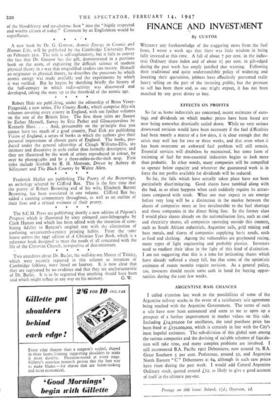FINANCE AND INVESTMENT
By CUSTOS
WITHOUT any foreknowledge of the staggering news from the fuel front, I wrote a week ago that there was little wisdom in being fully invested at this time. A fall of about 7 per cent, in the inchls- trial Ordinary share index and of about It per cent, in gilt-edged during the past week has amply justified that warning. Following their traditional and quite understandable policy of widening and lowering their quotations, jobbers have effectively prevented really heavy selling on the part of the investing public, but the pressure to sell has been there and, as one might expect, it has not been matched by any great desire to buy.
EFFECTS ON PROFITS
So far as home industrials are concerned, recent estimates of earn- ings and dividends on which market prices have been based are now being somewhat drastically scaled down. While no very serious downward revision would have been necessary if the fuel difficulties had been merely a matter of a few days, it is clear enough that the crisis may well last for two or three weeks, and that even when it has been overcome an awkward fuel problem will still remain. Essential services will doubtless be maintained, but some form of rationing of fuel for non-essential industries begins to look more than probable. In other words, many companies will be compelled to operate below capacity and wherever the guaranteed week is in force the net profits available for dividends will be reduced.
So far, the falls which have actually taken place have not been particularly discriminating. Good shares have tumbled along with the bad, as so often happens when cash suddenly regains its attrac- tions compared with stotk. What one may expect to see emerge before very long will be a distinction in the market between the shares of companies more or less invulnerable to the fuel shortage and ;those companies in the direct firing line. In the former class I would place shares already on the nationalisation lists, such as coal and electricity shares, all companies operating outside this country, such as South African industrials, Argentine rails, gold mining and base metals, and shares of companies supplying baitic needs, such as food and clothing. At-song the vulnerables are greyhound racing, many types of light engineering and probably plastics. Investors need to readjust their ideas in the light of this kind of distinction. I am not suggesting that this is a time for jettisoning shares which have already suffered a sharp fall, but that some of the optimistic estimates of recent months require revision. As a general policy, too, investors should retain some cash in hand for buying oppor- tunities during the next few weeks.
ARGENTINE RAIL CHANCES
I called attention last week to the possibilities of some of the Argentine railway stocks_ in the event of a satisfactory sale agreement being reached with the Argentine Government. The terms of such a sale have now been announced and seem to me to open up a prospect of a further improvement in market values on this side. Including L14,500,000 for ancillaries, the total purchase price has been fixed at Li5o,000,000, which is certainly in line with the City's 'most hopeful estimates. The sub-division of this global sum among the various companies and the devising of suitable schemes of liquida- tion will take time, and many complex problems are involved. I still recommend BA. Pacific 1912 Debentures, now around 70, B.A. Great Southern 5 per cent. Preference, around 52, and Argentine North Eastern "C" Debentures at 64, although in each case prices have risen- during the past week. I would add Central Argentine Ordinary stock, quoted around 02, as likely to give a good account of itself in the ultimate pay-out.


































 Previous page
Previous page